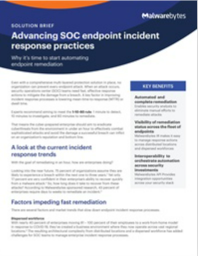Advancing SOC Endpoint Incident Response Practices
Even with a comprehensive multi-layered protection solution in place, no organisation can prevent every endpoint attack. When an attack occurs, security operations centre (SOC) teams need fast, effective response actions to mitigate the damage from a breach. A key factor in improving incident response processes is lowering mean-time-to-response (MTTR) or dwell time.
This means you should aim to eradicate cyberthreats from the environment as quickly as possible to effectively combat sophisticated attacks and avoid the damage a successful breach can inflict on an organisation's reputation.
Read More
By submitting this form you agree to Malwarebytes contacting you with marketing-related emails or by telephone. You may unsubscribe at any time. Malwarebytes web sites and communications are subject to their Privacy Notice.
By requesting this resource you agree to our terms of use. All data is protected by our Privacy Notice. If you have any further questions please email dataprotection@techpublishhub.com
Related Categories: AIM, Analytics, Applications, Cloud, ERP, Event Management, ITSM, Malware, Network, Service Management, Software


More resources from Malwarebytes

Best Practice Makes Perfect: Malware Response...
Before Covid-19, cyber security teams already confessed to being overworked – as high-profile security breaches, with malware at their root, were...

Malwarebytes Incident Response
When a cyberattack occurs, speed is one of the most critical factors in the remediation process. Cyber-prepared security teams should aim to eradic...

Advancing SOC Endpoint Incident Response Prac...
Even with a comprehensive multi-layered protection solution in place, no organisation can prevent every endpoint attack. When an attack occurs, sec...